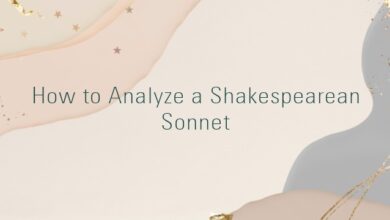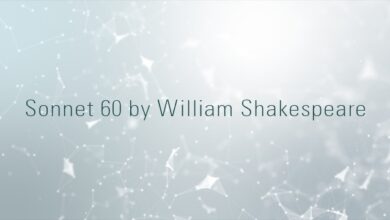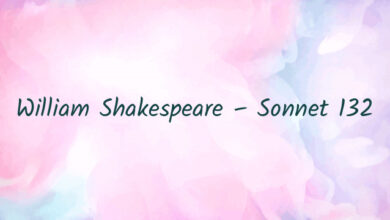
William Shakespeare – Sonnet 34
Why didst thou promise such a beauteous day,
And make me travel forth without my cloak,
To let base clouds o’ertake me in my way,
Hiding thy bravery in their rotten smoke?
‘Tis not enough that through the cloud thou break,
To dry the rain on my storm-beaten face,
For no man well of such a salve can speak,
That heals the wound, and cures not the disgrace:
Nor can thy shame give physic to my grief;
Though thou repent, yet I have still the loss:
The offender’s sorrow lends but weak relief
To him that bears the strong offence’s cross.
Ah! but those tears are pearl which thy love sheds,
And they are rich and ransom all ill deeds.
This is linked closely to the previous sonnet in thought and language. The offence referred to may be a neglect or denial by the youth of any attachment to his friend, despite having given him assurances that he was committed to enduring love. Hence the beauteous day which was promised, encouraging the poet to cast away the cloak of defensive secrecy. A denial of friendship appears to call forth the language of the Gospels through association of the experience with Peter’s denial of Christ. This was followed by Peter’s repentance and sorrow, and indeed tears, as here. Matt.26. 31-4, 74-5. Mark 14.30, Luke 22.61-2.
The link may be tenuous, but Shakespeare does in his plays use NT allusions as a subtle, oblique comment on situations that have arisen. Such a bold step is not without parallel in the Sonnets, as e.g. in 108
but yet, like prayers divine,
I must each day say o’er the very same;
Counting no old thing old, thou mine, I thine,
Even as when first I hallowed thy fair name.
where the echoing of the Lord’s Prayer is obvious. (Further details in the commentary below ll 10-12).
The 1609 Quarto Version
WHy didſt thou promiſe ſuch a beautious day,
And make me trauaile forth without my cloake,
To let bace cloudes ore-take me in my way,
Hiding thy brau’ry in their rotten ſmoke.
Tis not enough that through the cloude thou breake,
To dry the raine on my ſtorme-beaten face,
For no man well of ſuch a ſalue can ſpeake,
That heales the wound, and cures not the diſgrace:
Nor can thy ſhame give phiſicke to my griefe,
Though thou repent , yet I haue ſtill the loſſe,
Th’ offenders ſorrow lends but weake reliefe
To him that beares the ſtrong offenſes loſſe.
Ah but thoſe teares are pearle which thy loue ſheeds,
And they are ritch,and ranſome all ill deeds.
Commentary
1. Why didst thou promise such a beauteous day,Lines 1-2 echo the proverb ‘Although the sun shines, leave not your cloak at home’.
didst thou = did you (the youth; the sun).2. And make me travel forth without my cloak,travel – Q gives the spelling travaile, and the words travel and travail seem to have been indistinguishable in Elizabethan orthography. ‘Travel’ in the modern sense has lost its association with pain and toil, and has become a separate word.
without my cloak = unprepared for bad wetaher.3. To let base clouds o’ertake me in my way,base clouds -almosta repetition of the phrase used in 33.5:
Anon permit the basest clouds to ride
o’ertake me in my way = overtake me as I set out, overtake me as I progressed on my journey.4. Hiding thy bravery in their rotten smoke?bravery = splendid appearance;
rotten smoke = noxious vapours. Mists, fogs and all exhalations from marshes and damp places were considered to be foul and dangerous.5. ‘Tis not enough that through the cloud thou break,‘Tis not enough = it is not a sufficient alleviation (of my pain and disgrace).
that through the cloud thou break = that you do on occasion break through the cloud (and bring sunshine). There is a hint here of ‘even if you do’, or ‘given that you might’.6. To dry the rain on my storm-beaten face,Perhaps there is a suggestion here of the beloved youth wiping away tears from the lover’s face.7. For no man well of such a salve can speak,For no man can speak well of, or praise, such a salve, that etc.
salve = ointment, lotion.8. That heals the wound, and cures not the disgrace:disgrace – the shame, the scar tissue, which remains after the wound has healed. The disgrace in this case is the shame of having been (publicly ?) rejected by the youth. Or whatever else (unknown to us) that is hinted at as the offence and sensual fault that is the cause of their estrangement. Disgrace also had the meaning of physical disfigurement, a meaning which is now lost.9. Nor can thy shame give physic to my grief;shame – in the sense of being ashamed of some offence commited; physic = medicine, medical treatment.10. Though thou repent, yet I have still the loss:
repent – this, together with offender, cross, tears and ransom in lines 11 – 14 are words which invoke Christian teachings of sin, forgiveness and redemption. The tears of repentance in line 13, like Peter’s tears on remembering what Jesus had said to him, also point to a strong New Testament echo. (See notes to the next two lines). One may question whether the poet would have risked the charge of blasphemy by linking himself to Christ in this way (he is the one betrayed, the one who has to bear the cross, the one who forgives, the one for whom tears of repentance are shed). It is possible that the first audience for these sonnets, the ones in the inner circle for whom they were originally written, would have picked up the tenuous allusions and enjoyed them for the richness of context which they add to the poem. They are blasphemous only if taken in a mocking sense, but when used to show that all human love is a mirror of divine love, even to the details when that love endures betrayal, they become things of beauty. See the Introductory Notes for a discussion of the lover and the beloved as Christ figures. Here it is the poet who is the one betrayed by Peter who, even though he does repent, does not allay the suffering of Christ, (the onlie begotten). 11. The offender’s sorrow lends but weak reliefoffender = he who has commited the sin, one who has stumbled morally. In the tale of Peter’s denial of Christ, Jesus foretells that his disciples will ‘be offended’ because of him (i.e. caused to sin).
‘Then saith Jesus unto them, All ye shall be offended because of me this night: for it is written, I will smite the shepherd and the sheep of the flock will be scattered abroad.
But after I am risen again, I will go before you into Galilee. Peter answered and said unto him, Though all men shall be offended because of thee, yet will I never be offended.
Jesus said unto him, Verily I say unto thee, That this night before the cock crow, thou shalt deny me thrice’. Matt.26.31-35.
See also Mark 14.26-30.
Note that to offend = to stumble morally, to commit sin. (OED.2.).12. To him that bears the strong offence’s cross.cross – in the sense of burden, sorrow, Christ’s cross, which was the burden of the world’s sin. cross is Capell’s emendation for Q’s losse, which repeats the word from l.10. It seems a valid emendation, especially if one accepts the NT derivation of these lines. Matt. 10.38. And he that taketh not his cross, and followeth after me, is not worthy of me. Also Mark 10.34, Luke 9.23 & 14.27, esp. the latter: And whosever does not bear his cross…
strong = severe, harsh.13. Ah! but those tears are pearl which thy love sheds,pearls – pearls were jewels of costly price. They were also thought to have a medicinal value, if ground up and taken as a powder.
thy love = your love for me (causes to be shed).
sheds – Q gives the alternative, archaic spelling – sheeds – which preserves the rhyme.14. And they are rich and ransom all ill deeds.
rich = precious, valuable (pearls were scarce then as now, and were a valuable jewel);
ransom – in the sense of redeem, do adequate penance for. But also ‘pay the price of ‘. Sins could be regarded as running up a debt of punsihment which had to be paid off by the offender.






